- Home
- T. Kingfisher
The Raven and the Reindeer Page 5
The Raven and the Reindeer Read online
Page 5
The third house had a man living alone. He told her three times over supper that his wife had died and how lonely it was for him, and tried twice to touch her hair. His lower lip trembled when he talked. Gerta offered to sweep the porch, left a copper on the step to pay for her supper, and slipped away.
I may have spent the last seven months under a spell, she thought grimly, but I’m not a total fool.
The sun sank on her left. Gerta left the road, for the dubious comforts of another haystack.
She was tugging bits of hay into a nest when there was a flapping, fluttering noise, and a raven landed on the ground beside her.
Gerta raised her eyebrows. It was definitely not a crow. It was enormous and grey black. It tilted its head and looked at her with one bright eye, fluffing out a beard of narrow grey feathers.
“Are you hoping to share my dinner?” she asked. “Or pluck out my eyes?”
The raven hopped backward. “Auurk,” it said. It had a deep rattlebone voice. “Auurk.”
She tossed it a bit of bread.
It hopped closer, inspecting the bread. There was something wrong with one of its wings, she thought. It held the wing away from its body, not as if it were in pain, but as if it didn’t bend quite properly.
It picked the bread up and swallowed it neatly. “Auurk.”
“You’re welcome.” Gerta tossed it another crumb. It was strangely pleasant to have company that was not a human who might ask inconvenient questions. “What’s wrong with your wing, bird?”
The raven looked up. “I broke it,” it said simply.
Gerta’s jaw dropped.
“You talk…” she said.
“So do you,” said the raven. “Kudos all around. We are talking beings. Auurk.”
“Is this magic?” asked Gerta, getting to her feet. “Are you another witch?” She would walk all night if she had to. Frostbite was nothing compared to being trapped by another magician.
“Aurk!” said the raven contemptuously. “Aurk! Ravens have spoken since Odin brought us to sit on his shoulders. My great-grandmother rode on the Morrigan’s battle-harness. It is not our fault that humans are usually too cloddish to understand.”
Gerta pulled her cloak tightly around her shoulders, not sure what to do next. “Then why can I understand you?”
The raven made a very derisive squawking noise. “I’m not doing anything,” it said. “If you can hear me talk, it’s all on you.”
“Are you saying I’m doing something magical?” asked Gerta, baffled.
The raven turned its head to one side, then the other, fixing her with each eye in turn. “No,” it said finally. “You haven’t a drop in you. There’s magic coating you like frost on a tree branch, that’s all.”
“But how do I get rid of it?” asked Gerta.
The raven spread its wings. The right one did not extend all the way, and moved stiffly when it flapped. “Shouldn’t think you’d want to,” it said. “Being able to talk to ravens is a sensible magic. Moreso than most of the fool stuff you see flying about. Aurrk!”
It leapt. Two ragged wingbeats and it was aloft, the stiff wing dipping. It flew low over the ground, to a fencepost, and landed.
“Wait—!” called Gerta, but the bird took off again and was gone.
CHAPTER TEN
Gerta saw the raven again the next day, when she stopped to eat. A small copse of birch trees kept the wind from cutting through, and when the road passed through, she decided to stop for a few minutes. She had been smelling snow in the air, but was hoping that she was wrong.
She sat with her back to the largest birch, alternating mouthfuls of bread and cheese.
The raven landed in front of her, light on its feet despite the awkward wing. “Aurk!”
Gerta eyed it suspiciously. It tilted its head and eyed her right back.
“Do you still talk?” she asked.
“Hell of a thing to forget in a day,” said the raven. “Do you have any cheese?”
Gerta tossed a chunk of cheese to the bird. It snapped it up in a single bite and looked expectantly for more.
“Do you have a name?” asked Gerta.
“I do,” said the raven.
Gerta waited.
The raven fluffed its beard. “I am the Sound of Mouse Bones Crunching Under the Hooves of God.”
Gerta blinked a few times. “That’s…quite a name.”
“I made it myself,” said the raven, preening. “I stole the very shiniest words and hoarded them all up until they made something worth having. Sound and God were particularly well-guarded. Crunching I found in a squirrel nest, though.”
“May I call you Mousebones?” asked Gerta. “It’s…a lot to say all at once.”
It was hard for a creature with a beak to scowl, but the raven managed, mostly with the skin around its eyes. “I suppose,” it said. “If you must.”
“Mine’s Gerta,” said Gerta.
“There’s your problem right there,” said Mousebones. “Much too short and not enough in it. I don’t know how you expect to become anything more than you are with a name like that.”
Gerta put the bread and cheese away. The smell of snow was stronger, and she needed to move quickly if she wanted to find shelter by nightfall.
“Hugin and Munin,” she said, looking straight ahead at the road, “the ravens who sit on Odin’s shoulders, have names five letters long. Same as Gerta. They manage.”
“Aurk! Aurk! Aurk!” laughed the raven. “Oh, aurk! Not bad for a fledgling human, not bad. Who told you that?”
“My grandmother,” said Gerta. “She told me lots of stories. Fairy tales, mostly, but some about the old gods, too.”
Her grandmother had been a good Christian, as everyone in Gerta’s village was, but she loved a story and so Gerta had grown up on tales of Thor and Loki and Sampson and Martin Luther all tangled together like rumpled knitting.
“Aurk.” Mousebones hopped from fencepost to fencepost beside her, keeping pace. “You have no magic in you, you know, not even the little bits that come down because somebody’s great-great-grandsire crossed a fairy mound the wrong direction.”
Gerta tried not to feel insulted.
“You get it from your grandmother, I imagine,” said Mousebones. “That’s a guess. Only a guess, but a raven’s guess is worth more than a magpie’s. Aurrk!”
“Get what?” asked Gerta.
“No magic,” said Mousebones. “When it’s that strong, being unmagical is a thing itself. Like being a white raven. White ravens aren’t really white, they’re just an absence of black. But they’re very good at it.”
This did not make a great deal of sense to Gerta, but asking questions would probably just make things even more muddled.
There was also the small fact that she was talking to a raven, which was clearly a strange thing to do. Ravens were very canny birds, everyone knew, but they didn’t talk. Not to mortals, anyway.
And I am not a fairy and most definitely not a god. Gerta tried to think if any other class of people talked to ravens. Witches, maybe. Saints.
She did not think that she was a witch. She would have rather liked to be a saint, but saints tended to come to a bad end. Perhaps I’ll be martyred by the Snow Queen…
If the coming snow caught her outside of shelter, she would be martyred by the weather, and the Snow Queen wouldn’t have to bother.
It was probably not worth wondering if she was mad. She was already chasing after Kay, who had been abducted by a woman in a sleigh pulled by white otters. If she had gone mad, it had obviously been months ago, and there was no point in worrying about it now.
She kept walking.
Mousebones flew down the road a little way ahead of her, to root around in the ditch. When she drew abreast, the raven made a great hop and landed on her pack. Gerta grunted, more from surprise than the weight. It was the size of a cat, but very light.
“Mousebones?”
“Aurk?”
“Are you a he-ra
ven or a she-raven?”
“I am a raven,” said Mousebones, “and the rest is none of your business, as we’ll not be having eggs together.”
“Sorry,” said Gerta. “I just…it’s awkward thinking of you as ‘it.’”
“Oh no, a human feeling awkward. How terrible.”
Gerta flushed scarlet. Do saints blush? What about witches?
Mousebones tilted its head, opened its beak and carefully gripped her ear.
“What are you doing? Stop that!” Gerta ducked her head. It had felt like blunt scissors on her skin.
“It turned so red, I couldn’t resist,” said the raven. “Was that a blush? White ravens don’t do that.”
Gerta mumbled something. She had thought that it would be less embarrassing to talk to a bird than a human, but apparently not.
She put her head down and walked very fast.
After a dozen fenceposts had gone by, Mousebones said “Sorry. You’re only a fledgling and out of the nest a bit too soon, aren’t you?”
Gerta shrugged. The raven sank its talons into her pack and flapped to keep balance.
“The other human girl I know isn’t much older than you, but she came out of the egg with all her pinfeathers. I’m being rude.” Mousebones picked up a lock of hair in its beak and preened it down, which felt even stranger than its beak on her ear had.
“Thanks,” said Gerta, almost inaudibly. She wondered who the other girl Mousebones knew was—had she handled a talking raven better?
“You may call me he,” said Mousebones, “for ‘it’ is an ugly word. I may feel differently later, but I will inform you first.” He groomed another bit of her hair. “Are we well, Gerta?”
It had an air of ritual to it, even with the informality of the words.
“We’re well, Mousebones,” she answered.
“Good.”
CHAPTER ELEVEN
The snow that night came quietly at first, a few flakes and a few more flakes, then settled into a business-like snow that did not trouble itself with theatrics. The winds did not howl and the flakes did not dance. They simply fell straight down, thick and white and relentless.
There were no haystacks. There were no farmhouses. Gerta had been watching for one for hours, and there were none. The fields were grey and barren. The last house had been four hours ago, before she stopped for lunch.
Even the fences had ended. Gerta had a grim feeling that she had walked out of the fields and into moorland.
“Should I have gone back?” she asked Mousebones.
“Does it matter?” asked the raven. “You didn’t go back.” He shook himself, and snowflakes fell off his shining black feathers. “Snow. I never liked snow.”
“I thought birds spent the winter in the land of the dead,” said Gerta.
“Aurk!” He gave her a suspicious look. “Who told you that?”
She shrugged. “I don’t know. Everyone, I guess.”
“Nobody I know,” said the raven. “I’ve certainly never been to the land of the dead.” He considered this. “Maybe sparrows. Sparrows always seem like they know more than they’re telling.” He flew to a fencepost and fluffed his beard briefly.
Gerta shoved her hands deeper into the fur muff. At first she left small, melted boot-prints on the road.
After a time, they no longer melted and she left white prints on white. The wind began to pick up but the snow fell as thick as ever.
If the snow had been deeper, she would have been in better spirits. Every child in the village knew how to build a snow cave and hunker down in it—it was one of the things you learned about winter, like throwing yourself flat on ice that started to crack, like watching out for icicles that might fall off the eaves and drive themselves into your skull.
But a few inches of cold, wet snow were different than two feet of dry, packable snow. Gerta took a deep breath and felt the cold like knives in her chest.
“It is possible that I am going to die,” she said. She wanted to feel badly about this, but her nose was running in the cold and it was hard to concentrate on her own death when she felt as if she might drown in snot. She wiped furiously at her nose and wished for a handkerchief.
“It is a certainty that you are going to die,” said Mousebones. “All living things die. Then we eat their eyes.”
“How nice,” said Gerta. “Are you going to eat my eyes?”
“Well, obviously. You’d want a friend to do it, wouldn’t you?” Mousebones groomed a snowflake off her hair. “And it’s not like you’d be using them.”
Gerta sighed and wiped her nose on her sleeve again. The inside of her nostrils felt raw.
“However,” said Mousebones, “since you have given me cheese and carried me all this way, I will not eat your eyes today, unless you want me to.”
“Want you to?”
“Well,” said Mousebones, fluffing up all his feathers and settling them again. “Some people do. For wisdom, you know. I could pluck out an eye and eat it and then the other one would have the second sight. In theory.”
“Does that work?” asked Gerta.
Mousebones made a drawn out aaaurrrrr-rrr-rrk sound. “It might,” he said, a bit doubtfully. “I just handle the eye-eating bit. The second sight is somebody else’s problem.”
Gerta could think of nothing to say to that.
“I don’t know why people want second sight anyway,” the raven added. “You’d think seeing one world would be enough.”
“I might give an eyeball if I could see a haystack right now,” said Gerta, sighing. It seemed unlikely. Visibility had plunged and now the world was grey and white only a few yards off the road. Even if there were mysterious mobile haystacks lurking in the moors, she wouldn’t be able to see them.
The raven launched himself into the air. Gerta ducked her head, startled. “That wasn’t an offer!” she yelled after him.
Mousebones paid her no heed. She could see the stiffness in his bad wing as he flapped away into the snow.
She tried not to feel bereft. Presumably a raven could roost in a tree somewhere and not freeze to death. She couldn’t. There was no reason Mousebones should stay with her and freeze.
Gerta had pulled the hood of her cloak low and her face was wet where her breath steamed up into it. She definitely was not crying. It would be stupid to cry about a raven.
“He’d only have eaten my eyes anyway,” she said glumly.
The snow grew thicker and thicker. It was no longer crunching underfoot, but piling up silently. Gerta felt as if the world was growing larger and larger, or as if she were growing smaller and more insignificant, a little hooded mouse toiling along the road, not even leaving tracks behind her.
She stopped and pushed her hood back. The wind cut at her wet cheeks and froze her eyelashes.
She could see the road ahead and behind, and nothing else.
I am going to freeze. I could walk ten feet from a farmhouse and never know.
She could taste despair on her tongue, like dust.
I might as well lie down in the snow and get it over with. At least it will be painless. They say freezing is the best way to die.
And then, from overhead, she heard the high, familiar chime of bells.
CHAPTER TWELVE
Gerta looked up.
All she could see at first was white snow rushing at her from a pale grey sky. It was a dizzying perspective, and for a moment she felt queasy, as if the snow was still and the ground was rocketing upward.
Then a shape passed overhead, white-on-grey, eerily silent except for the chiming bells. The white otters poured through the sky, running on air as easily as they had run on snow. The sled cut a long path through the sky, leaving a snowless wake behind it.
Gerta was below and a little to the left. She could not see much of the interior from her angle, but the Snow Queen stood in the front of the sled, and behind her, dark-haired and wrapped in furs, but with his head bare—
“Kay!” cried Gerta. “Kay!”
The Snow Queen heard, though, and as the sled ran past, she turned her head.
Her single glance fell over Gerta like a blow.
—mewling, red-faced, mortal, stinking of sweat—
Gerta staggered and went to one knee under the weight of her own uselessness.
The Snow Queen’s gaze flicked away. Gerta gasped for air, feeling the cold stab her lungs, and what did it matter, none of it mattered, she should lie down and die the snow was clean and she was filthy but if it covered her over no one would see what a wretched creature she was and that was the best that she could ever hope for.
“No,” said Gerta. She had to bite the word and spit it out. “No. I can’t die now. Someone needs to help Kay.”
Kay is alive. I just saw him. If I am a wretched, filthy creature, so be it. I don’t have be anything else. I just have to get to Kay.
Kay deserves better than me, but I’m all there is.
The thought got her back to her feet. Her knee was soaked through from kneeling in the snow and the backs of her hands were burning.
She found the fur muff and shoved her hands in it. Walking…yes. That was next. She could walk.
She stumbled forward.
Mousebones found her a few minutes later and landed on her pack. “Well,” he said. “That was something. Did you see the crazy sled pulled by otters?”
“The Snow Queen,” croaked Gerta, too broken to realize that Mousebones had returned. “She has Kay. I have to get him back, but I’m going to freeze to death.”
“You don’t sound so good,” said the raven.
Gerta took a deep breath and then a swallow of water from her flask. It was slushy with ice and chilled her deeply, but her lips and tongue moved more easily for it. “She looked at me,” she said. “It’s…I think it’s something she does. Did she look at you?”
Mousebones raised his head. “I should say she did. I nearly flew into her.”
Gerta turned her head. She could just see the long, wicked beak alongside her cheek. “And when she did, you didn’t…you didn’t feel…”

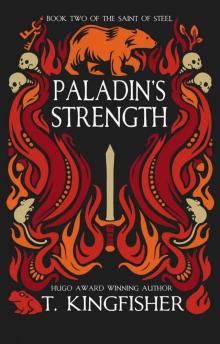 Paladin's Strength
Paladin's Strength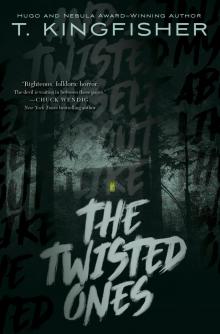 The Twisted Ones
The Twisted Ones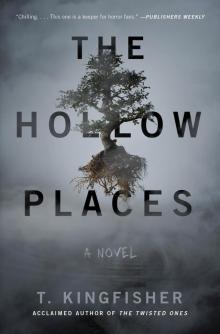 The Hollow Places
The Hollow Places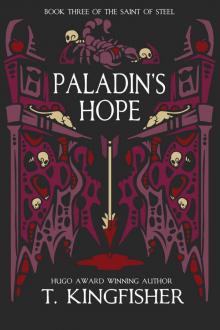 Paladin’s Hope: Book Three of the Saint of Steel
Paladin’s Hope: Book Three of the Saint of Steel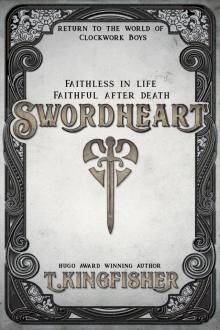 Swordheart
Swordheart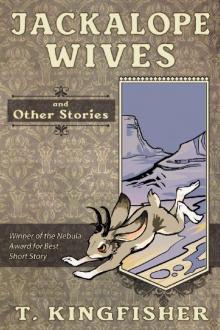 Jackalope Wives And Other Stories
Jackalope Wives And Other Stories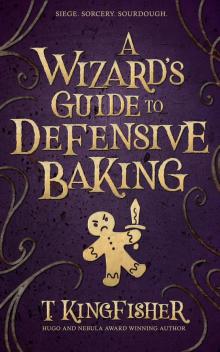 A Wizard's Guide to Defensive Baking
A Wizard's Guide to Defensive Baking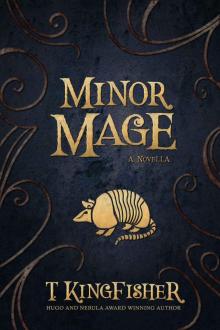 Minor Mage
Minor Mage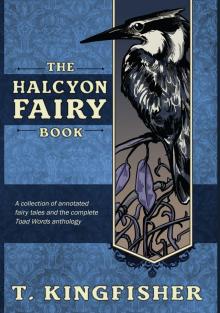 The Halcyon Fairy Book
The Halcyon Fairy Book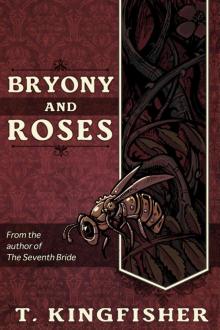 Bryony and Roses
Bryony and Roses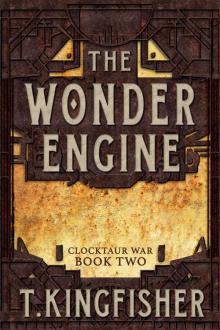 The Wonder Engine_Book Two of the Clocktaur War
The Wonder Engine_Book Two of the Clocktaur War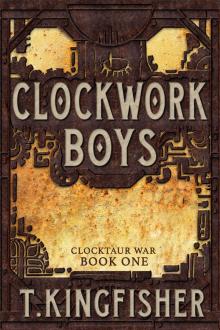 Clockwork Boys: Book One of the Clocktaur War
Clockwork Boys: Book One of the Clocktaur War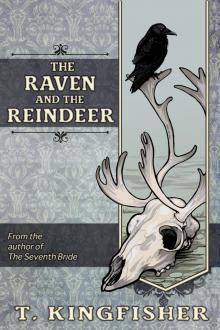 The Raven and the Reindeer
The Raven and the Reindeer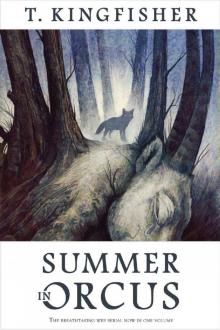 Summer in Orcus
Summer in Orcus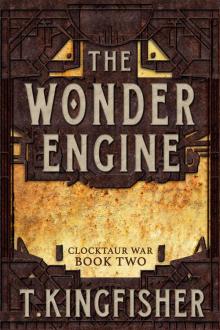 The Wonder Engine
The Wonder Engine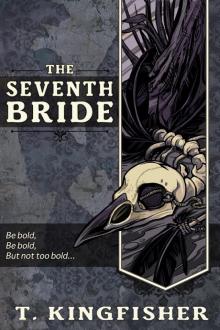 Seventh Bride
Seventh Bride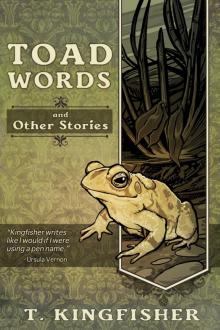 Toad Words
Toad Words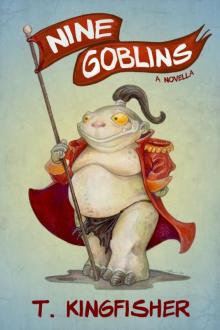 Nine Goblins
Nine Goblins